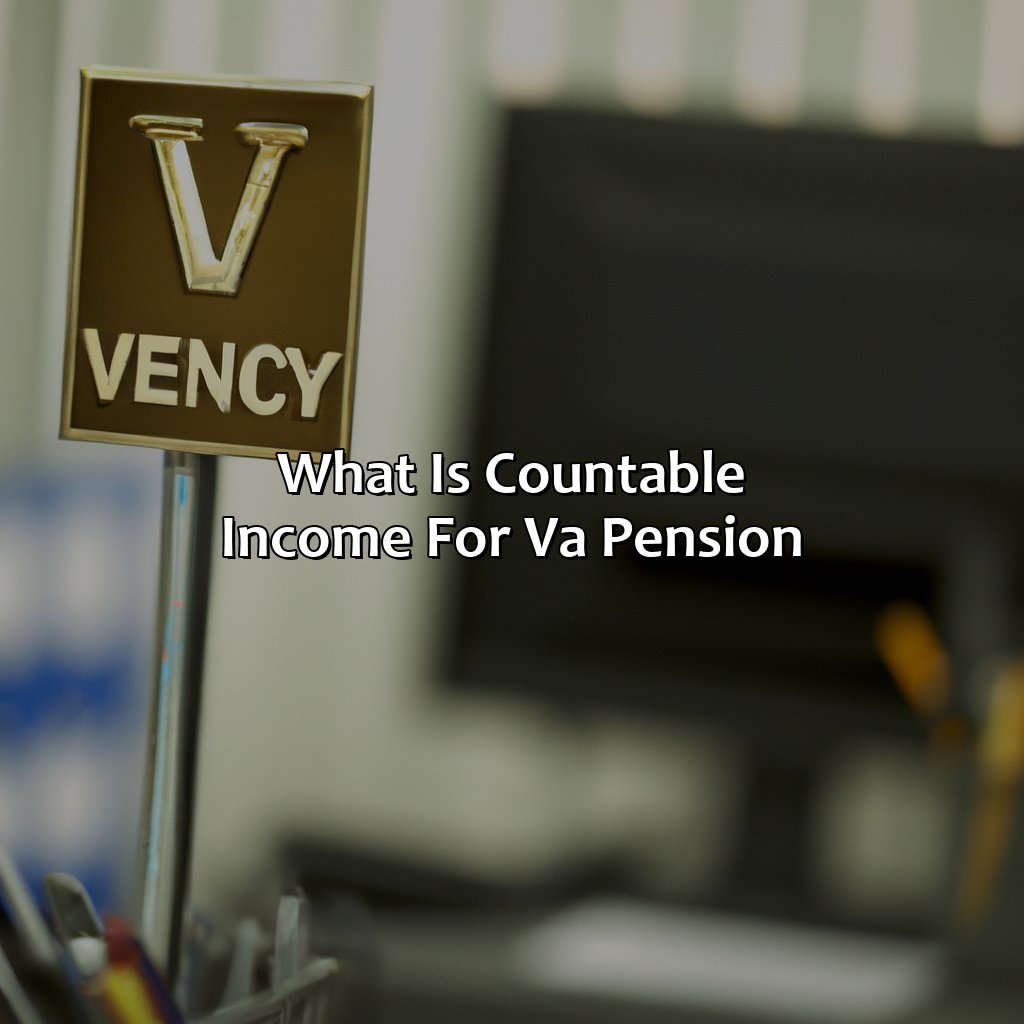What Is Countable Income For Va Pension?
Key Takeaway:
- Countable income for VA pension is the amount of income that is considered when determining an individual’s eligibility and pension amount. It includes all income from all sources, unless it is specifically excluded.
- There are several types of countable income, including earned income, pensions, retirement accounts, and rental income. Exclusions from countable income include certain medical expenses, certain education expenses, and certain unreimbursed business expenses.
- Strategies to reduce countable income for VA pension include using medical expenses to reduce income, transferring assets, and allocating income between spouses. It is important to carefully document and report all income and changes in income to avoid penalties for non-compliance.
Are you trying to understand what countable income is for VA Pension? This article aims to provide a comprehensive overview of this topic and help you understand the requirements associated with it. By reading this article, you can gain the essential knowledge needed to realize the full potential of your pension benefits.
What is Countable Income for VA Pension?
Know your eligibility for VA pension? Need to understand countable income? Here’s the deal: Countable income is income that is used to determine eligibility and the amount of VA pension. Look out for different types of countable income. Also, some exclusions may apply to you, so check those out too!
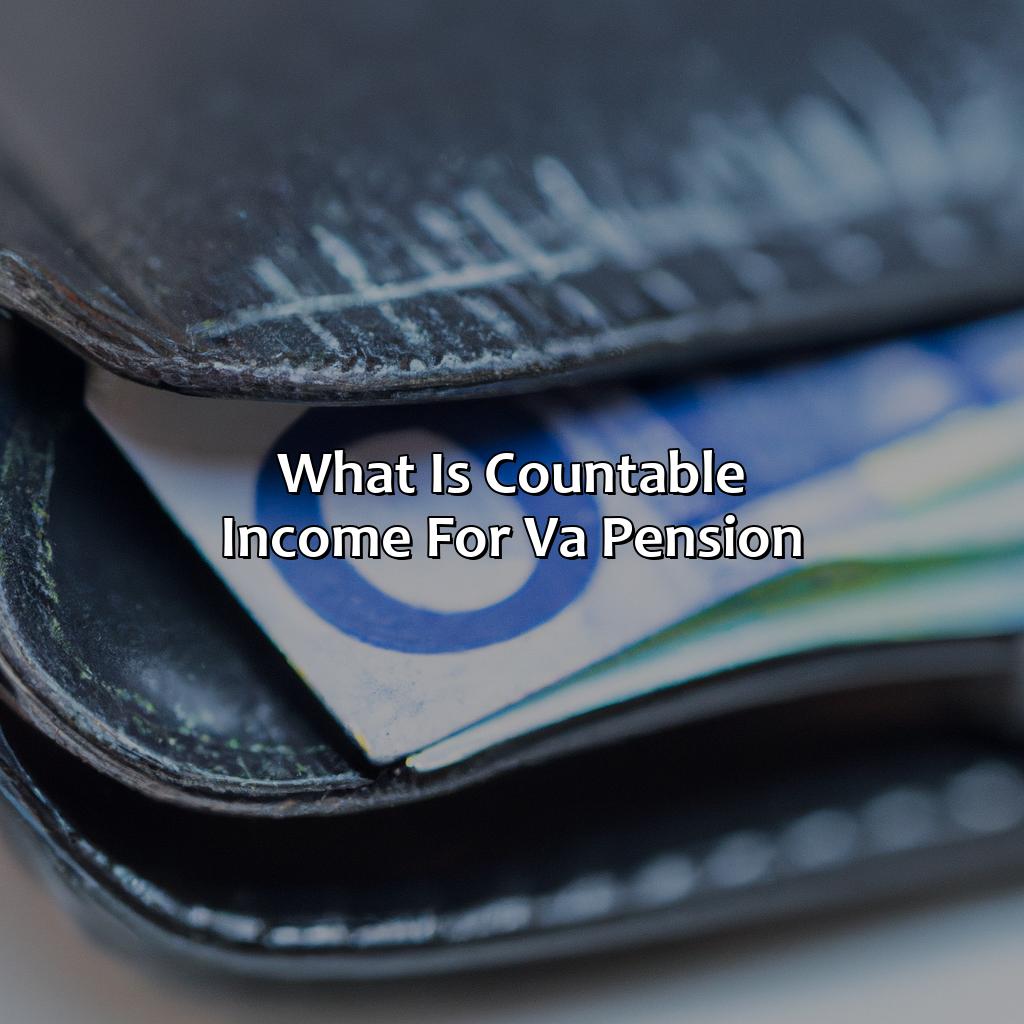
Image credits: retiregenz.com by Harry Jones
Definition of Countable Income
Countable income refers to the income earned by an individual that can be used to determine their eligibility for VA pension. Income such as wages, retirement benefits, and investment dividends are considered countable. Income from disability compensation and federal aid programs is excluded.
Furthermore, certain expenses, such as medical expenses, may also be deducted from countable income in the calculation of VA pension benefits. It is important to note that there are different eligibility requirements for different types of VA pensions.
In addition, countable income may vary based on factors such as marital status and dependents. This means that the determination of countable income can be a complex process.
According to the Department of Veterans Affairs (VA), as of 2021, the maximum annual pension rate for a single veteran with no dependents is $13,931 per year.
To find out more about qualifying for a VA pension, individuals should contact their local VA office or visit the official VA website for information and guidance.
Overall, understanding what is considered countable income is essential for veterans seeking VA pension benefits. It is recommended that individuals consult with a financial advisor or VA representative for further information on eligibility and benefit calculations.
Counting your dollars and cents is important for VA Pension eligibility, but if only counting sheep could pay the bills too.
Types of Countable Income
Countable income for VA pension encompasses various forms of compensation that the Pension and Fiduciary Service considers in determining eligibility. These earnings come with exemptions and special rules that applicants should take note of to avoid costly mistakes.
One effective way of understanding Countable Income for VA Pension is by reviewing different types of expected/lifecycle incomes, including but not limited to Social Security benefits, Employment Income, Retirement Benefits and/or Pensions, Interest/Dividend/Capital Gains/Cash Gifts & Other Income.
| Types of Countable Income | Description |
|---|---|
| Social Security Benefits | Retirement Pay amount |
| Employment Income | Salaries or gross proceeds from self-employment |
| Retirement Benefits and/or Pensions | Amount paid per month or year before withholdings |
| Interest/Dividend/Capital Gains/Cash Gifts & Other Income | Dividends, net rental income less expenses |
While some types of countable income are straightforward (e.g., rental income), unique situations may arise from practical complexities such as variable commissions or the sale of a business.
VA Pension eligibility determination dates back to World War I when Congress passed a disability pensions law for veterans. The natural history alone highlights how important it is for ultimately eligible veterans to have a grasp about what counts as VA income going into any application process.
Your paycheck may count, but don’t worry, your secret underground treasure trove is safe from the VA’s countable income clutches.
Exclusions from Countable Income
Various types of income are considered countable when applying for VA pension benefits. However, certain exclusions from countable income can help veterans qualify for benefits under certain conditions. These exclusions include disability compensation payments, aid and attendance benefits, reimbursements from medical expenses, and more.
Moreover, other sources of income like Social Security payments and interest on savings accounts may also be excluded based on specific eligibility requirements. These exclusions can contribute towards determining the net worth of a veteran’s assets and thereby their eligibility for pension benefits.
Additionally, it is important to seek professional financial advice while planning one’s income sources to maximize potential exclusions from countable income. This can include structuring assets in a specific manner or creating legal trusts and wills that align with VA regulations. By doing so, veterans can potentially increase their chances of receiving additional financial support through VA pension benefits.
Counting your income for VA pension eligibility is like trying to balance a see-saw on a tightrope one wrong move and you’re out of luck.
How Countable Income Affects VA Pension Eligibility
To comprehend the influence countable income has on VA pension eligibility, you should be aware of income limits. Countable income calculation is also relevant. Here we’ll briefly cover sub-sections:
- Income limits for VA pension,
- Calculation of countable income,
- And the effect of countable income on pension amount.
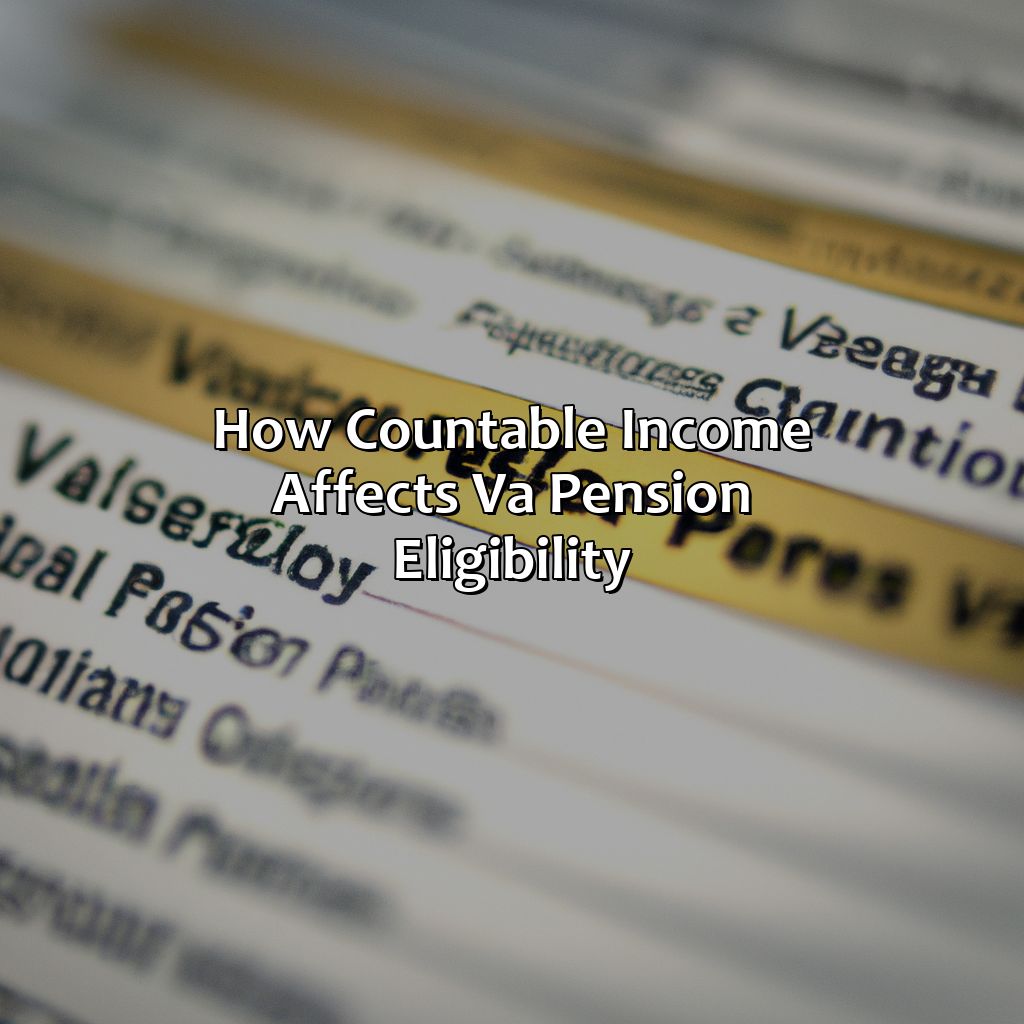
Image credits: retiregenz.com by Yuval Washington
Income Limits for VA Pension
The countable income affects the eligibility criteria for VA pension, which is a financial support provided to disabled wartime veterans and their families. To qualify for this pension, certain income limits must be adhered to.
| Maximum Annual Pension Rate (MAPR) | Veteran Alone | Veteran with One Dependent | Veteran with Two Dependents | Additional for Each Additional Child |
| Basic MAPR – Income $13,931 | $14,934 | $18,008 | $20,795 | $2,351 |
|---|
Understanding that tax-exempt income can affect countable income is crucial when calculating the eligibility criteria. Any veteran’s non-taxable income or expenses can be added back to increase the overall countable value.
In a report by the US Department of Veterans Affairs from 2020 Fiscal Year, approximately $96.4 billion was paid in compensation and pension benefits.
According to the US Department of Veterans Affairs’ report from 2020 Fiscal Year. Get ready to do some math, because calculating countable income for VA pension eligibility is like trying to solve a Rubik’s Cube blindfolded.
Calculation of Countable Income
To determine VA Pension eligibility, it is essential to calculate Countable Income. This calculation takes into account specific factors that can impact an individual’s ability to receive the pension.
Below is a breakdown of the Calculation of Countable Income:
| S.no | Type of Income | Amount |
|---|---|---|
| 1. | Gross Income from Employment | $ |
| 2. | Interest and Dividend Income | $ |
| 3. | Net Income from Business or Farm | $ |
| 4. | Rental and Royalty Income | $ |
| 5. | VA Disability Compensation (Exclude Aid and Attendance, Housebound) | $ |
| 6. | Pension Benefits | $ |
| 7. | Spouse’s income (if applicable) | $ |
It’s important to note that not all types of income are included in this calculation. For example, Supplemental Security Income (SSI), Public Assistance, and some Welfare payments do not count as income for VA purposes.
In addition to these calculations, it’s crucial to stay up-to-date on any changes or updates regarding VA Pension eligibility criteria. With benefits available to veterans who served during wartime or their surviving spouses, ensure you seek out these resources available through the U.S Department of Veterans Affairs. Don’t miss out on potential benefits – stay informed.
Remember: The slightest increase in countable income could disqualify you from receiving a VA Pension. Be diligent in your calculations and consult with a professional if needed.
Don’t count your chickens before they’re counted as countable income for your VA pension.
Impact of Countable Income on Pension Amount
VA Pension Eligibility can be affected by Countable Income. Countable income is the income generated in one’s household, such as earnings, social security benefits or other pensions. This income has a significant impact on how much pension one is eligible for.
Furthermore, when calculating countable income, several factors are taken into consideration. These include the number of dependents and other allowable deductions that could help to decrease the amount.
It’s crucial to understand that veterans with excessive countable income above the threshold may not be eligible for VA Pension. Therefore, it’s essential to be mindful of all sources of countable income while applying for VA Pension Eligibility.
It should also be noted that there are resources available through which veterans can seek assistance in managing their finances to meet eligibility requirements for VA pension programs.
According to the Department of Veterans Affairs (VA), if you want to learn how to get a pension, a veteran with a disability rating of 50% and above, who have served during wartime, is eligible for a basic pension payment.
Lowering your countable income for VA pension is like playing a game of limbo, how low can you go?
Strategies to Reduce Countable Income for VA Pension
Lower your countable income for VA pension by using strategies like medical expenses, transferring assets, and allocating income. This way, you can meet the VA pension requirements. Let’s explore further. Each solution can help cut down your income.
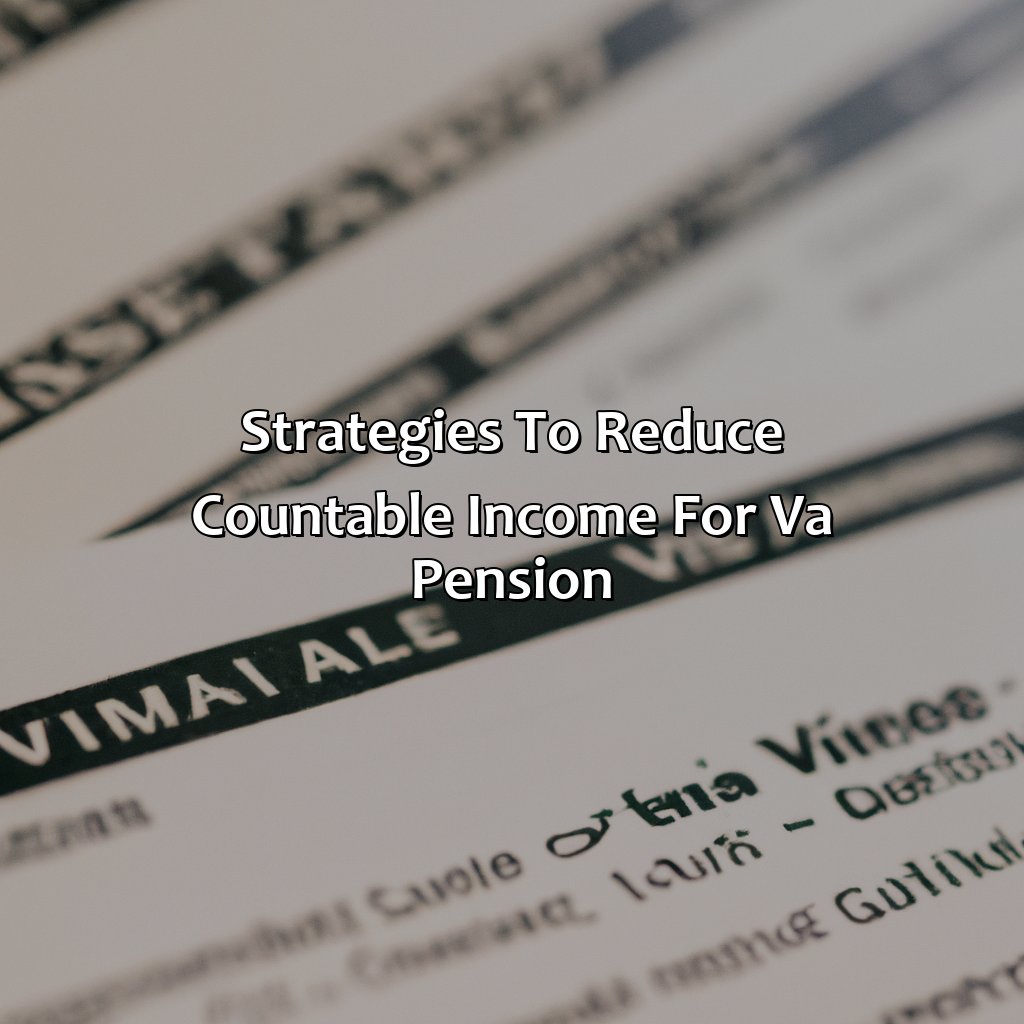
Image credits: retiregenz.com by Yuval Jones
Use of Medical Expenses
One way to reduce countable income for VA Pension is by utilizing medical expenses. The VA allows veterans to deduct unreimbursed medical expenses from their income when calculating pension eligibility. These expenses can include medical services, equipment, and supplies that are not covered by insurance or another program.
It’s important to note that only out-of-pocket costs exceeding 5% of the maximum annual pension rate can be counted towards this deduction. Additionally, the expenses must be for medical care related to a veteran’s disability or age-related needs. If you want to know how much the VA pension is, you can check out our website for more information.
By keeping track of these types of expenses and submitting them as part of the annual requirement for pension eligibility, veterans can potentially reduce their countable income and receive a higher benefit amount. It’s essential to maintain all receipts and records for the expenses and coordinate with any healthcare providers to ensure documentation is accurate.
In a true story, one veteran was able to significantly increase his monthly pension amount by taking advantage of this deduction. He kept detailed records of his medical expenses throughout the year and submitted them with his yearly pension application. As a result, he received an additional $500 per month in benefits. You can learn more about how to get pension in the UK and make the most of your benefits.
When it comes to transferring assets for VA Pension, remember: the only thing harder than letting go of your money is explaining to your grandkids why they won’t be getting any inheritance.
Transfer of Assets
When it comes to VA Pension, reducing countable income is crucial. The transfer of possessions that are considered assets can be an effective strategy in achieving this. It involves relocating ownership and control of these assets to another person or entity.
Transferring assets can come in many forms such as gifting, purchase of annuity, or conversion of countable assets into non-countable ones. However, it is important to keep in mind the potential consequences and limitations that come with each method. Seeking professional advice can help identify the most appropriate solution for individual situations.
It is worth noting that transferring assets does not guarantee pension eligibility. The VA has implemented rules and regulations regarding asset transfers that must be complied with to prevent penalties or disqualification.
Failing to explore options for transferring assets could lead to a significant reduction in pension benefits. Start considering these strategies and seek proper guidance before it’s too late. If you’re wondering how much Va survivors pension you are eligible for, consult with a financial advisor for guidance on your countable income.
Allocating income is like playing a game of Tetris, except instead of blocks, you’re trying to fit dollars into different categories.
Allocation of Income
When applying for VA Pension, it is essential to understand how the Allocation of Income works. This refers to the process of categorizing and dividing income into countable and non-countable income. Countable income is used to determine eligibility for VA Pension benefits.
Reducing countable income may increase pension benefits. Medical expenses are a common method of reducing countable income as they can offset or eliminate some forms of income, such as Social Security. Another strategy is setting up an irrevocable trust or converting countable assets into non-countable assets, such as a home or vehicle. If you want to learn more about how to claim a war pension, you can check out some resources online.
It is important to note that certain types of income cannot be reduced, such as wages and salaries. However, understanding the Allocation of Income process can help applicants maximize their potential benefits.
According to the Veterans Benefits Administration website, “the maximum pension rate for veterans with no dependents is $13,931 per year (as of December 2020)”.
Warning: Failing to document and report properly may result in more paperwork than a DMV on a Monday morning.
Documentation and Reporting Requirements
Understand countable income to meet VA pension benefits documentation and reporting requirements. This section focuses on this topic. It has three sub-sections – Documentation of Countable Income, Reporting Changes in Income, and Penalties for Non-Compliance. Know these to avoid losing out on benefits or incurring penalties.
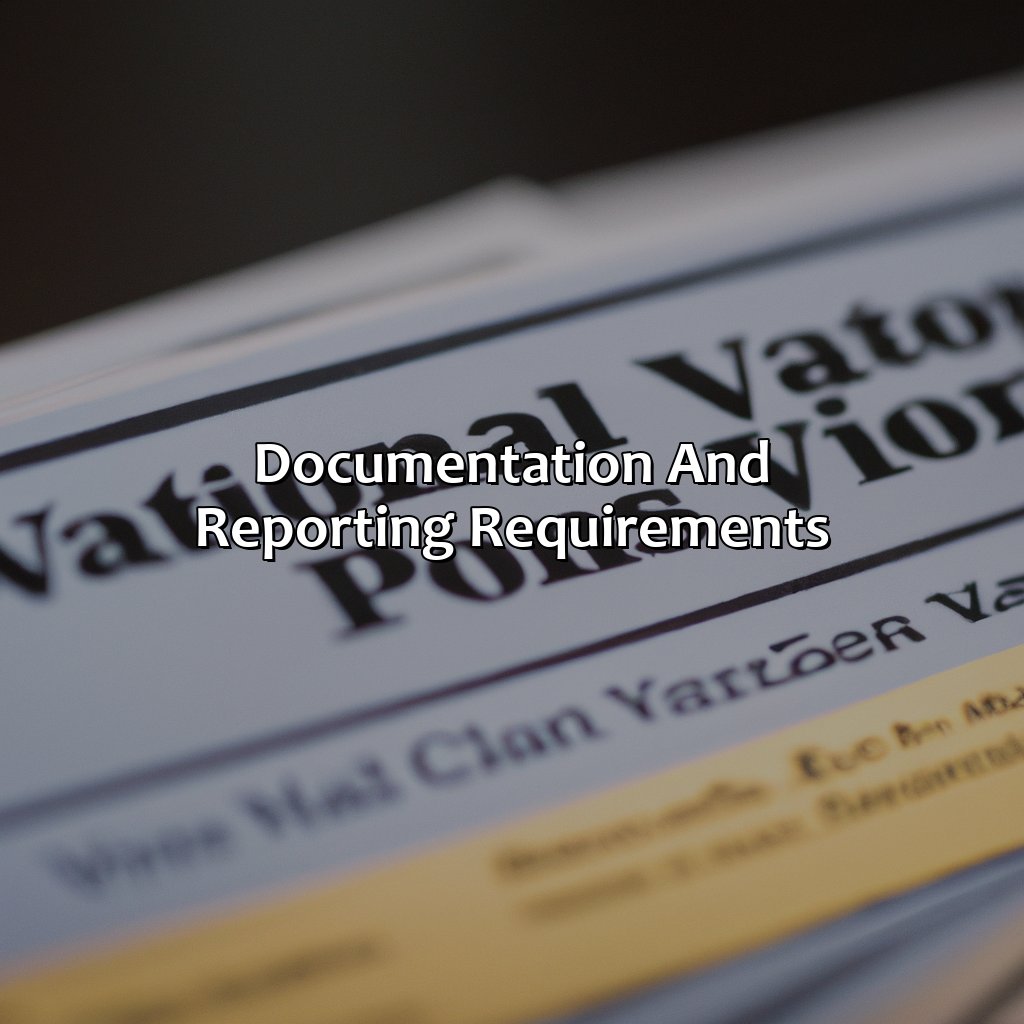
Image credits: retiregenz.com by Harry Duncun
Documentation of Countable Income
When applying for VA pension benefits, it’s vital to document all sources of countable income. This includes earnings from employment, retirement accounts, and social security benefits. Accurately reporting all countable income is crucial in determining eligibility and the amount of pension received.
It’s recommended to keep detailed records and documentation of all income sources to avoid any discrepancies or oversights. Additionally, it’s crucial to report any changes in countable income promptly and accurately to prevent potential penalties or repayment obligations.
Further, VA disability pension applicants should be aware that not all forms of income are considered countable by the VA. For instance, gifts or inheritances are generally exempt from being counted as income for VA purposes. Knowing what is and isn’t countable can help ensure accurate reporting and reduce delays in the application process.
To ensure the accuracy of countable income documentation, working with a certified financial planner or tax professional may be beneficial. These professionals can provide advice on how to properly document different types of income and expenses effectively.
In summary, accurately documenting countable income is critical for VA pension eligibility. Keeping detailed records, understanding what is considered countable income, and seeking professional assistance if needed can help ensure accurate reporting and reduce potential complications in the application process. Learn how to create a pension to secure your financial future.
Who knew keeping track of your income changes could be so exciting? It’s like a game of reporting income limbo – how low can you go without losing your benefits?
Reporting Changes in Income
It is important to keep the Veteran Affairs (VA) updated about any changes in your income as it affects your pension eligibility. Failure to report such changes may result in improper payments or delays in receiving your benefits. The VA requires all claimants to disclose significant changes in their income and financial resources.
All sources of income must be reported, including Social Security benefits, disability compensation, retirement funds, annuities, and investments. Changes include but are not limited to; increases or decreases in wages/salary, new investment gains or losses, changes in marital status and so on. Details about the frequency and amount of net income must also be disclosed.
Reporting inaccuracies may lead to consequences like loss of eligibility or overpayments that may have been paid out improperly. To avoid these mistakes, verify with the VA what counts as countable income and report any change immediately for proper documentation. How long do you have to work for the VA to get a pension?
It is important to understand what the VA pension is and its countable income. Claimants should be familiar with the reporting requirements and ensure they are complying with the latest rules. Failing to do so can have adverse effects on your pension’s stability.
A female veteran filed her VA pension claim but failed to report an increase in her social security benefit from $1000 a month to $1200 a month. Her claim was denied after a routine review since she did not follow up on reporting requirements despite sending out multiple reminder letters by mail. This resulted in delay for her benefits indefinitely until she amended her application thoroughly identifying all other sources of income properly.
Skipping documentation requirements is like playing Russian roulette – except the bullets are replaced with hefty penalties.
Penalties for Non-Compliance
Non-conformity to the VA pension’s documentation and reporting requirements can lead to severe repercussions. Any failure in complying with the laid-down rules can result in delays in receiving pension payments, suspension or termination of pension benefits, and even legal action if found that the non-compliance was intentional or fraudulent. It is imperative for the beneficiaries to provide accurate and timely information regarding their income, medical expenses and household composition.
Proper recording keeping should be done for the income received from all sources, including social security benefits and annuity payments. Any mistake or omission could have serious consequences resulting in imposition of fines or other penalties by the VA. False declarations made can also lead to criminal charges, which could affect not only an individual’s VA Pension but other governmental financial assistance programs as well.
Pro Tip: Seeking professional assistance from financial planners or tax accountants can help ensure complete compliance, reducing any chances of penalties for non-compliance.
Wrap it up like a neater-than-average mummy with these helpful resources for understanding VA pension countable income.
Summary of Countable Income for VA Pension
| Priority Level | Maximum Annual Income Limit Based on Priority | Net Worth Limit |
|---|---|---|
| Priority Group 1 | $13,931 | $129,094 |
| Priority Group 2 | $21,107 | $129,094 |
| Priority Group 3 | $27,830 | $129,094 |
| Priority Group 4 | $34,792 | $129,094 |
| Priority Group 5 | $44,176 | $129,094 |
| Priority Group 6 | $48,488 | $129,094 |
| Priority Group 7 | $61,084 | $129,094 |
| Priority Group 8 | $0 | $129,094 |
It is essential to note that some income or assets may not count towards your net worth or annual limit in certain situations. As an example, certain medical expenses may reduce your income level if they are recurring expenses.
Pro Tip: If you’re not sure whether something you own or receive counts as income or an asset, it’s best to speak with VA representatives to determine its effect on your net worth and pension eligibility.
Resources for More Information.
In the quest for exploring VA pension and how countable income is determined, it’s essential to dive deeper into more information regarding this subject. Here are some helpful resources to gain a better understanding of what constitutes countable income.
- One can find detailed guidelines on the Department of Veterans Affairs website.
- Consult with accredited VA benefits attorneys or agents who possess expertise in handling pension claims.
- Veterans Service Organizations (VSOs) offer support services to assist veterans in filing their claims at no cost.
- The National Care Planning Council provides an exhaustive glossary that helps users understand complex terms related to retirement, eldercare, and touchpoints for veterans’ service organizations.
It’s crucial to note that individuals may have unique circumstances requiring assistance not covered under these resources. You can seek advice from state Veterans Affairs agencies or community organizations offering relevant assistance.
Pro Tip: Keep track of your documentation throughout the application process. This will come in handy if you need to contest any denials or appeal decisions made by VA officials.
Five Facts About Countable Income for VA Pension:
- ✅ Countable income for VA pension includes wages, retirement income, and Social Security benefits. (Source: VA.gov)
- ✅ Certain expenses, such as medical expenses and care costs, can be deducted from countable income for VA pension purposes. (Source: Elder Law Answers)
- ✅ Income from annuities, interest, and dividends must be included in countable income for VA pension. (Source: ElderLawAnswers)
- ✅ Veterans may be eligible for additional pension benefits if they have dependents or are housebound or in need of aid and attendance. (Source: VA.gov)
- ✅ VA pension benefits are tax-free and can help cover the cost of long-term care for eligible veterans. (Source: A Place for Mom)
FAQs about What Is Countable Income For Va Pension?
What is countable income for VA pension?
Countable income for VA pension includes income from most sources, such as earnings, pension, Social Security benefits, and any other retirement income. The amount of income that is countable depends on the individual s circumstances and the type of income received
What income is not counted for VA pension purposes?
Some examples of income that are not counted for VA pension purposes include Supplemental Security Income (SSI), certain welfare benefits, and some payments from Indian tribal organizations. Additionally, some expenses such as medical expenses or educational expenses may be subtracted from an individual s countable income
How is countable income calculated for VA pension?
Countable income for VA pension is calculated by subtracting any non-countable income from the individual s gross income. The resulting amount is then compared to the VA s income limits for the specific pension program to determine eligibility and the amount of pension benefits
What is the current income limit for VA pension benefits?
The VA s income limits for pension benefits vary depending on the individual s circumstances, such as their marital status and dependents. As of 2021, the maximum annual pension rate for a veteran with no dependents and no housebound status is $13,931. If a veteran is housebound or has a dependent, the maximum annual pension rate increases
What happens if my countable income exceeds the VA pension limits?
If an individual s countable income exceeds the VA s pension limits for their specific program, they may still be eligible for pension benefits if they have high medical expenses. In this case, the individual may be able to deduct their medical expenses from their countable income, which could make them eligible for pension benefits
How do I apply for VA pension benefits?
Individuals who are interested in applying for VA pension benefits can do so by completing an Application for Pension form and submitting it to their local VA office. They will also need to provide documentation of their military service and income, as well as any medical expenses and dependents they may have
